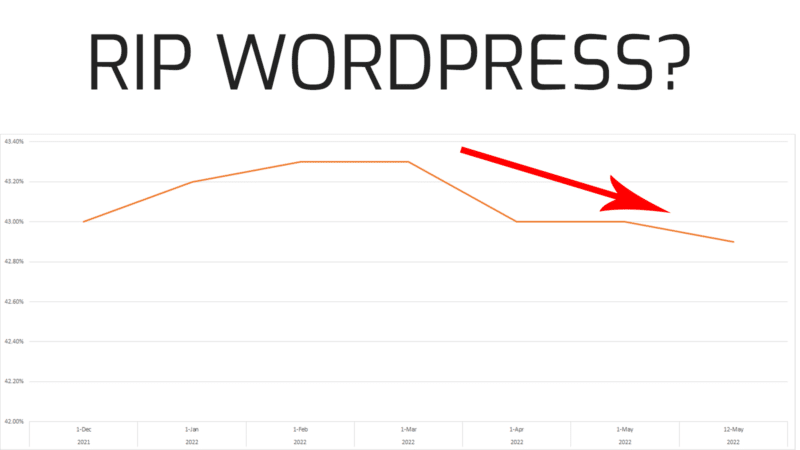
Why WordPress’ Diminishing Market Share Shouldn’t Come As A Surprise
As highlighted by Joost de Valk and WP Tavern, WordPress’ market share has first stagnated and now fallen since the start of the year. Considering how long WordPress has enjoyed consistent growth, some people will be rightly surprised and/or concerned about what that means for WordPress. Here’s my hot take on why it shouldn’t be a surprise and why it’s not as big an issue as it may seem.
1. The sample size of the data itself is incredibly small.
10 million sites sounds like a lot, but in reality it’s just a small portion of the web. Looking at the (very limited) usage statistics for the most popular plugins, such as Contact Form 7 and the Classic Editor, we can see they’re being actively used on more than 5 million sites. Considering WordPress’ market share is apparently 43%, 4.3 million sites, the numbers don’t align. Obviously any survey cannot be truly exhaustive, but in terms of web platforms I’m not convinced the number of sites covered is enough to give an accurate depiction of platforms used. And considering the sites surveyed are based on arbitrary ranking factors, these numbers are based more off the strength of the underlying business as opposed to the popularity of the platform.
2. The Classic Editor plugin is one of the most popular plugins.
It says a lot about the state of WordPress that the most popular plugin in the history of the project is one that disables the features that have pretty much been the sole focus of the project for the past 5 years. I do love the block editor, conceptually at least, but the way it was implemented has been really problematic. Now that Full Site Editing has been introduced, it’s unfortunately extremely limited and been implemented in a way that ensures I will never use it. I’m sure I’m not the only person who feels this way. It’s very clear that the vast majority of users are not happy with the direction the project is going.
3. COVID has killed the community
One of the most important factors behind WordPress’ growth has been the community. Unfortunately, COVID put a hold on in person events, and they’re only just now, 2 and a half years later, starting to appear again. Only in March this year did I attend my first meetup in person since 2019. The sad reality is virtual events, when you consider things like zoom fatigue and inability to have private conversations, are simply not as engaging as in person events.
4. Core has become hypocritical
WordPress core has now adopted some of the most hated “features” used by themes and plugins, such as popups with poor dismissal handling, giant admin notices and an editing experience that nobody wants but are forced on by default by someone who thinks their opinion matters more than the entire community. Everyone is up in arms when third party plugins do this, so why do the core contributors think it’s a good idea?
5. When you’re at the top the only way is down
There’s only so much you can grow. As technology evolves, other platforms emerge that can evolve faster than a 20 year old project with a (sometime excessively) strict adherence to backwards compatibility. It had to reach a tipping point sooner or later. It’s still 10x that of the next most popular CMS.
